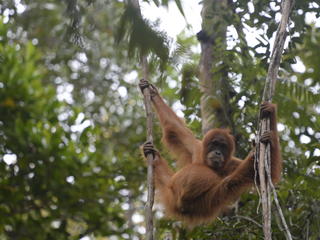Photo Credit: Wildlife Conservation Society
Second in a series by Leo Carter (LBJ MGPS Student) covering his internship at the Wildlife Conservation Society.
The savannah stalker sprawled out on the dais, fur bristling, her tail tracing loops in the air. The cheetah basked in the cool, climate-controlled air of the Rayburn House office building. Elsewhere, in a room normally reserved for high-level congressional hearings and the approval budget bills to decide the spending priorities of the world’s wealthiest nation, two gawky lynx cubs wrestled with each other in front of tipsy onlookers. Everywhere around us, house interns scurried this way and that, snapping up all the free stickers, bookmarks, and plush elephant dolls they could carry. They fought for a place in line at the open bar while stuffing fistfuls of hors d’oeuvres in their mouths. The cheetah looked on with an air of self-confident indifference. At the lectern, Representative Ted Poe (R-TX)—one of many who spoke at the event—eulogized Satao, a famous Kenyan bull elephant with some of longest tusks on record, felled last year by the poisoned arrows of poachers. Nearby, supermodel and wildlife ambassador Veronika Verakova posed for photos with eager, over-stimulated interns.
The lively reception, following a much more sober briefing on the current poaching crisis in Africa, intended to build awareness on the Hill for the disastrous rate of decline of some of the world’s most charismatic species. With all the free swag and photo opportunities, however, it seems that some of the attendees may have missed the crux of the issue. The loss of a quarter of Africa’s elephants in a year 3-year period did not spur the urgency you might expect. This is the difficulty in demanding action on an issue that appears remote to so many in a largely myopic political system. It is difficult to say whether or not the evening’s events—hosted by the Wildlife Conservation Society (WCS) and World Wildlife Fund, among others—had their intended effect. For what it’s worth, they did draw a crowd.
In order to bridge the gap between a seemingly distant problem and the agendas of U.S. policy-makers, the issue of wildlife conservation needs to be brought closer to home. I devoted much of my time at WCS this summer to creating policy profiles for the key lawmakers support we sought for S. 27 and H.R. 2494 [see previous post for information on these bills]. I combed their voting records, bill sponsorships, even aspects of their personal histories to find linkages between issues they supported in the past and our efforts to combat transnational wildlife crime. I studied their districts to find WCS supporters, zoological parks, and other pockets of the representatives’ constituents that supported wildlife conservation causes, in order to better prepare our lobbyists for their ten minutes of face-time—sometimes less—with a key aid, or if fortunate, the representative proper.
Through a chance meeting in a bar one night, I had the opportunity to set-up an official meeting on S. 27 with the senior aid of a state senator. What started as friendly conversation about our home state quickly became a serious discussion about the poaching crisis and its impact on American interests abroad. I quickly learned that work in D.C. doesn’t end once you leave the office, and some of the most important opportunities arise when you least expect them. Sometimes the serious talk doesn’t happen until the neckties are loosened and the first few beers already emptied. After much groundwork and research involving linkages between wildlife trafficking and transnational organized crime, U.S. border security, drug smuggling, and militant groups in central Africa, one of our lobbyists and I went into this meeting prepared for any question the aid might have for us. During our 45-minute conversation, we presented on the severity of the poaching crisis, the impact it is having on stability in Africa, the prevalence of wildlife trafficking in the U.S., and the specifics of what S. 27 will do to help address these problems. With some luck, and a bit more persistence, our bill will gain a co-sponsor, and the Wildlife Trafficking Enforcement Act will come one step closer to becoming law.
A long time can lapse between the introduction of a bill and when it is first heard in committee, and momentum is critical. All the letters, phone calls, meeting, briefings, and receptions I participated in build awareness of this urgent problem within Washington and around the country. Since I began at WCS at the end of May, the number of House of Representative cosponsors for H.R. 2494 has increased from eight to 73 thanks to the involvement of concerned citizens and the hard work of conservation NGOs and devoted policy-makers from both sides of the aisle. It is still a long road before it is signed into law, and both before and after, more hard work will be needed to ensure this issue remains present in the minds of both policy-makers and their constituents.
Edited by Jon Brandt

